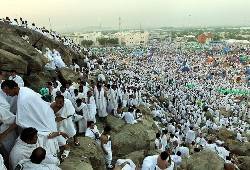More than two million pilgrims who poured out of the city of Mecca to begin the annual Hajj, have flocked Arafat.
Muslims performing Hajj stayed in Arafat under very tight security measures.
Under the stringent penal action and safety regulations during the pilgrimage season, four thousand motorcycles, more than 27 thousand vehicles and above 30 thousand people were rejected due to the lack of Hajj permit, said the Saudi Interior Ministry.
The fact that the kingdom accounts for the overwhelming majority of MERS (coronavirus) cases reported around the world has raised concerns pilgrims could be infected and return to their homelands carrying the virus.
But the authorities have said they are optimistic the Hajj will pass without incident, given Muslims also go on lesser pilgrimages at other times of the year and there has been no problem.
Experts are struggling to understand the MERS coronavirus, for which there is still no vaccine.
It is considered a deadlier but less transmissible cousin of the SARS virus that erupted in Asia in 2003 and infected 8,273 people, nine percent of whom died, and sowed economic chaos.
Arafah rituals end at sunset and pilgrims then move to Muzdalifah for shortened Maghrib and Isha prayers and for a short rest.


 Home
Home Discover Islam
Discover Islam Quran Recitations
Quran Recitations Lectures
Lectures
 Fatwa
Fatwa Articles
Articles Fiqh
Fiqh E-Books
E-Books Boys & Girls
Boys & Girls  Articles
Articles










